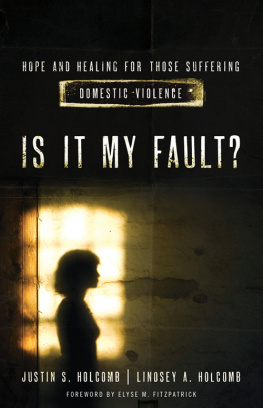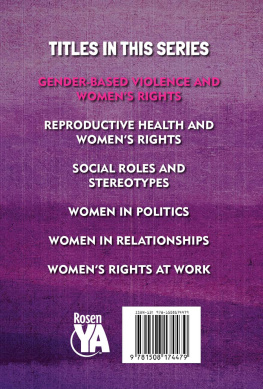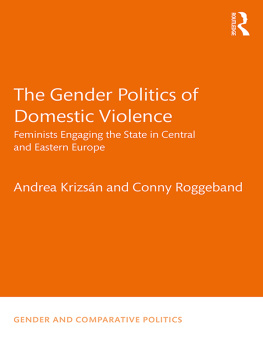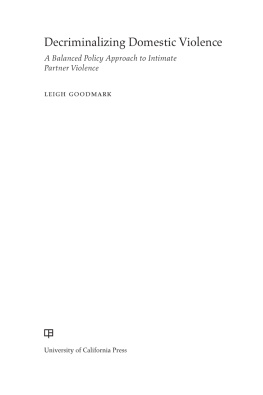2013 by Vanderbilt University Press
Nashville, Tennessee 37235
All rights reserved
First printing 2013
This book is printed on acid-free paper.
Manufactured in the United States of America
Library of Congress Cataloging-in-Publication Data on file
LC control number 2012030216
LC classification HV6626.23.C5P37 2013
Dewey class number 362.82'92dc23
ISBN 978-0-8265-1895-8 (cloth)
ISBN 978-0-8265-1897-2 (e-book)
ACKNOWLEDGMENTS
Since the first time I traveled to Santiago, Chile, in the southern hemispheres winter of 2000 to conduct preliminary fieldwork, I have become indebted to so many people who helped me produce this book and who saw me through the process it took to arrive here. Though I will not be able to name each person who has contributed, for those who remain nameless here, as well as the ones whose support and encouragement I mention, thank you. Although this work would not have been possible without these individuals and the wide communities of which I am a part, any errors and omissions herein are, of course, mine.
As my mentors in the Rutgers University Department of Anthropology, Dorothy Hodgson and Peter Guarnaccia have provided me with consistent and valuable support and intellectually stimulating ideas for directions to take. Their scholarship has continued to be a beacon for my own career and to inspire me to push through to new and meaningful analyses. I was fortunate to work with Peter, first as a graduate student, then as a Postdoctoral Fellow in the Rutgers Institute for Healths National Institute for Mental Health Postdoctoral Program. He introduced me to the field of trauma and recovery and to examining categories for understanding peoples many forms and manifestations of suffering. Dorothy encouraged me to think about womens agency and power in new ways. She consistently pushed me to improve my ability to express my ideas in written form with her incisive, challenging, and productive readings of my work. I have benefited greatly from Dorothys skill and precision as an ethnographer.
Meredeth Turshens insights into how wider suffering affects womens lives in particular ways have greatly influenced my thinking. Her passion for bringing to light how womens experiences of health and illness, and war and recovery are shaped by inequalities has accompanied me when it was difficult to continue. Her beautiful artwork has accompanied me as well. Charlotte Bunchs work on UN womens rights frameworks as director of the Center for Womens Global Leadership at Rutgers University greatly influenced my interest in and dedication to the topic of domestic violence against women as a human rights issue. In particular I am grateful for my involvement with the Womens Global Leadership Institute during the summer of 2002. Janet Siskind provided her generous support of my work and introduced me to Lesley Gill. I had the great fortune to know Lesley and receive her mentorship and learn from her scholarship. She pushed my thinking about gender, class, and militarization in Latin America and I learned so much from the conversations she, Andrew Bickford, and I shared around her kitchen table. I continue to draw from her work and the many insights and great energy she shared with me.
Southern Methodist University provided generous support for my follow-up research in 2009 and 2011 and for the writing of this book. I am also grateful for support from the Sam Taylor Foundation for my 2009 field trip to Chile. Writing of this book was also supported by a National Institute for Mental Health Postdoctoral Fellowship at the Rutgers University Institute for Health, where I had the opportunity to be mentored by Alan Horwitz, David Mechanic, and Peter Guarnaccia. I am grateful for the support I received to complete this research from 2002 to 2004 from the Fulbright-Hays program, the Wenner-Gren Foundation for Anthropological Research, and the Rutgers University Graduate School. Thank you especially to Teresa Del Corso at Rutgers, who provided me with thorough, critical, crucial, and patient readings of drafts of these grant proposals. I also received a Rutgers University Bevier Award to complete my dissertation write-up, as well as a Rutgers University Institute for Research on Women Fellowship for my participation in their seminar, Diversity: Expanding Theory and Practice, during the 20042005 year.
Mostly, I owe a great debt to the women whose voices make this book speak and who made it possible for me to write this book. Without their participation and generosity in sharing their painful and triumphant stories with me, this book would not exist. For the women who suffered domestic violence in Chile who are my friends and those with whom I was in contact only for a brief moment, I hope that I have managed to do some justice here to their experiences and expressions. They taught me so much about their own lives and about life. I thank them for participating in this project and sharing intimate details of their life stories. Their courage was a constant source of inspiration as I wrote this book. I will not mention any of their names here because I am ethically bound to maintain their anonymity in all ways possible, but I will use the pseudonyms for the women whose stories most loudly inform my analysis. Gracias, Marisol. Eres una amiga para siempre y me das mucha energa para seguir luchando. Gracias, Luz, por darme la oportunidad de aprender de ti sobre como crecer a travs de la pena. Gracias, Josefina, por compartir tus experiencias tan profundas.
The various staff members at Safe Space and the director and staff at Family Care were always supportive and more than generous in welcoming me into their professional worlds. I am in their debt for having taught me so much about their work and the contexts in which they help women who suffer domestic violence. Many thanks to Chilean sociologist Carolina Soto for her support of my work and for her kind friendship. Quiero darle las gracias a mi querida amiga, Xime. My most heartfelt gratitude goes to Xime, whose insights are so coherent and whose life work toward improving womens rights is truly exemplary and a source of reflection and motivation.
My participation in the 20042005 Rutgers University Institute for Research on Women Seminar nourished my thinking. The scholarship and ideas that abounded in the weekly seminars were inspirational. I especially appreciated Nancy Hewitts mentorship and her support of my scholarship, and Temma Kaplans pointed advice on my project pushed me to delve deeper into feminist historical analyses of the Chilean historical context.
to reproduce some of that here. I also thank Mark Luborsky, as well as the anonymous reviewers, for a very productive set of exchanges that helped me to refine my analysis in that article.
Many friends have been supportive along the way. I thank Molly Burke-Len for the many conversations we shared over the years about our mutual interests in womens lives, stories, and gender equality. Thank you to Meg Winnecour, who is a great inspiration and creative spirit and who translated this book into the painting that graces its cover. Mylene Labrins friendship, sharp wit, and practical support helped me to navigate my first visits to Chile and well beyond. Mylene, you are one of my personal heroes, as you know. Thank you for my smart, brave, and kind Emilio and Pascal. Family members in Chile have been consistently a source of support. Thank you Nona, Carlos, Sandra, Claudio, Noah, Simn, Carlos Andrs, Nico, Violeta, Mario, Jimena, Sofa, Gabriel, and Matas. I consider Nancy Noton, Manuel Echeverra, and their family an important part of our Chilean family who offer us constant warmth and friendship.







